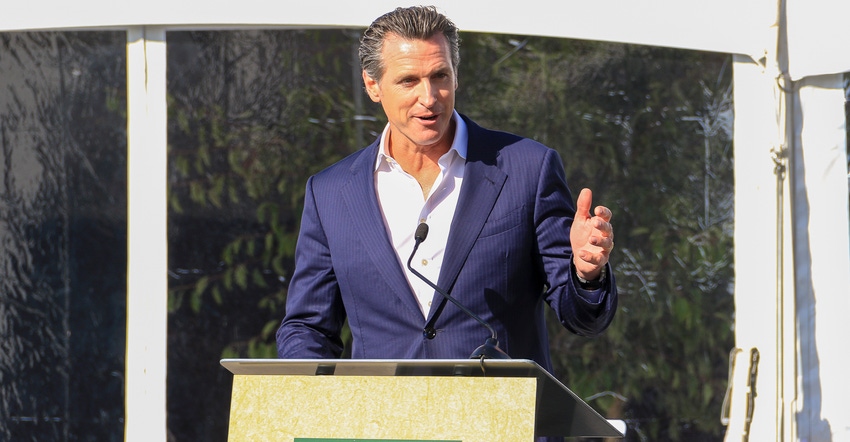
California's governor is an ironic character. While farmers were willing to give him credit for meeting more with them early in his role than his predecessor did, his actions of late speak louder than his feigned concern for growers.
Gov. Newsom's political philosophies and his decisions on issues surrounding water and workers' compensation say it all. While it is easier for some to flee for states that value personal liberty and freedoms more than those who make up California's supermajority do, it is not that simple for farmers and the businesses that support them to pack up and move out.
Why should they leave? California has the best soils and climate type in the United States to grow food. Farmers there embrace technology, have long practiced sustainable farming before it became a overused buzzword and a check box on an audit. It is the only place we know of in the U.S. that can grow almonds effectively and arguably has some of the most scenic landscapes to view and photograph in the country.
California has long been attractive to settlers and others for its rich mineral resources, mild weather and ability to grow just about anything. After the Dust Bowl chased folks west a musical sound was borne from settlers to an oil town called Bakersfield, where cotton later became king.
In the spirit of not wanting to let a good crisis go to waste, Newsom will now punish farmers for the COVID-19 illnesses their employees may have contracted from neighbors, at their local grocery store, or while just out and about. An executive order (because getting the legislature to pass something in regular session is apparently too cumbersome, even for a governor of the same political stripe) mandating that workers' compensation benefits be afforded those who contracted COVID-19 will not help the struggling farmers he glad-handed early in his tenure.
Groups including the Agricultural Council of California, California Farm Bureau Federation, California Fresh Fruit Association, the Nisei Farmers League and Western Growers criticized the governor for his action.
In his statement on the governor's action, Nisei League President Manuel Cunha said bluntly "there are federal, state, and health care programs in place that are better suited to help these people." Yet Gov. Newsom would rather saddle farmers and their insurance companies with these costs. This surely will not help the disparity between California and other states as, for instance, workers' compensation costs for cotton gins in Arizona double when crossing the Colorado River into California due to the state's regulatory constraints.
Newsom's latest action comes after suing the Trump Administration earlier this year over water rules that would help growers. Trump's visit to Bakersfield to announce an easing of water restrictions was challenged in court the following day.
This "death by a thousand cuts" will likely reach a crescendo sooner than later as farmers tire of being wrongly blamed, fined, taxed and over-regulated.
About the Author(s)
You May Also Like






